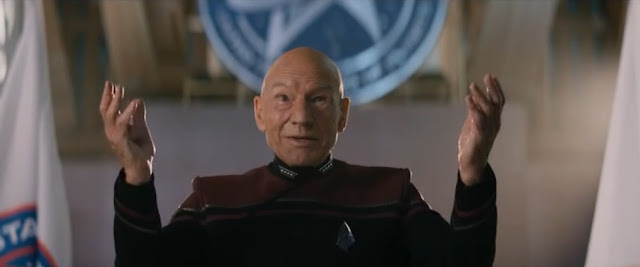 |
| Picard gives a speech about second chances. |
THOUGHTS ON SEASON TWO:
Fair warning: This is a look at the season as a whole. If you haven't seen Season Two yet, know that there are spoilers throughout!
I mostly liked Season One of Picard, which felt like a legitimate attempt to do what good science fiction has always done: Used the idea of the future to reflect on the present. The show opened with Picard disillusioned and resigned to a world moving in the wrong direction, with the story gradually bringing him back to his old self over the course of the season.
There were certainly flaws. Not all the characters were well used, and the general idea of a Starfleet suffering from moral decay seemed to vanish midway through. Even if I didn't like every creative choice (such as Picard's synthetic body), I still enjoyed the story and at the very least respected the ambition.
I found Season Two to be more of a mixed bag. It fixes many of the first season's problems, but it replaces them with all new missteps. I found most of it to be entertaining, and even the worst episode remains watchable... but I didn't find the story to be as interesting. In the end, I was left feeling underwhelmed.
But before I explore the reasons for my disappointment, let me start with what the season did well...
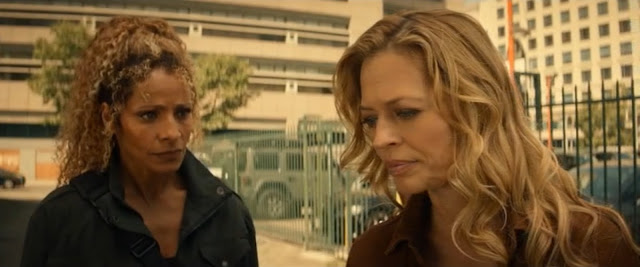 |
| Seven and Raffi struggle to reconnect amidst an ocean of personal issues. |
FORWARD PROGRESS - CHARACTERS:
The cast is much better used in Season Two than in Season One. Every member of the ensemble gets at least a few moments in the spotlight, and the scripts allow them some enjoyable and well-written interactions.
Now, this is likely helped by the early episodes culling a couple of "extra" characters. Soji, the central character of Season One's story, is seen in the first episode just long enough to establish that she's on a diplomatic mission and won't be joining the rest of the characters. Elnor is present for the first stage of the mission, but he gets killed in Episode Three.
I think this was a good choice. Had both characters been retained, they would have just been additional crew members in need of things to do. Removing them makes it more viable to give quality material to the other regulars. Elnor's death also fuels Raffi's character arc, while Isa Briones gets a decent supporting role through the magic of time travel doppelgangers.
I complained about the Season One finale just establishing Raffi and Seven as a couple without having ever shown any interaction between them. Season Two takes this clumsily created relationship and makes it work. Having missed the chance to show their initial connection, the writers do the next best thing. They start the season with them estranged, broken up by the multitude of personal issues each of them has. Then the rest of the season sells them as a couple by showing them overcoming those barriers. It even ties in with the season's theme of revisiting the past. As Picard observes in a graduation speech early on, second chances are rare. Seven and Raffi get one, because although their relationship already failed, their feelings for each other remain.
Finally, there's Agnes Jurati. Despite second name billing and a role in the story that should have made her central, Season One often shunted Alison Pill's neurotic scientist to the periphery. She gets a much stronger role in Season Two. Like Seven and Raffi, her relationship with Rios has failed between seasons, but she is not looking to reconnect. She's alone - and despite an apparent yearning for connection, she seems determined to stay that way.
This not only makes her vulnerable to the Borg Queen's manipulations, it also allows the scripts to thematically parallel her with the Borg. Many of the season's best moments come from this: the connection with the Borg Queen in Assimilation, Jurati's attempts to co-exist with the Queen in Two of One, and her appeal to the Queen in Hide and Seek. Alison Pill is excellent throughout, and she plays particularly well opposite Annie Wersching's Borg Queen.
There's really only one character whose arc didn't work for me in Season Two. Unfortunately, it's kind of a big one...
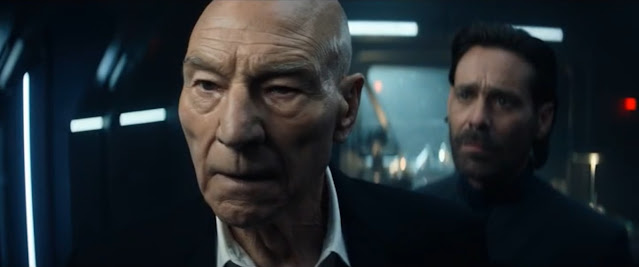 |
| Picard struggles to learn lessons he already learned before. |
PICARD'S JOURNEY:
I see what the writers were attempting with Picard. Q takes him and his crew into the past to save the future, while at the same time Picard is forced to confront his own past to overcome emotional issues interfering with his happiness in the present. On paper, it sounds fine, even clever.
Other opinions are certainly available, but I didn't think the execution of it worked at all.
One problem for me is that much of the material regarding Picard's past has no real connection, either in terms of plot or theme, to the external threat he's dealing with. Only Hide and Seek manages to overcome this problem, thanks to Picard using the tunnels from his childhood against the villains. Monsters, on the other hand, resorts to dream sequences/flashbacks that feel thinly motivated at best.
The other problem is that those are the only two episodes that significantly address his past and his need to confront it. This is the basis of his arc, and yet aside from these two episodes it is only occasionally even mentioned. It's hardly surprising that, in a ten-episode season, an arc that's ignored for full episodes at a time doesn't get a chance to properly build.
My final complaint might also be my biggest issue: TNG already trod a lot of this ground, and frankly in better episodes. Picard's strained relationship with his family was at the core of Season Four's Family. There, he (somewhat) mended his relationship with his brother. Here, he comes to realize that his late father wasn't the stern monster of his memory but was actually dealing with considerable emotional pain himself. It's a worthy enough lesson... but I can't escape feeling like we've done this already!
The other lesson Picard must learn is that, however badly he may wish to, he cannot change the most painful moments of his past. Even if he could change them, the results would probably not be to his liking. Again, he's already had this realization - thanks to Q, no less! - in Tapestry. Now, it's fair enough to echo past episodes. Given how much Star Trek was cranked out in the 1990s, some echoes are inevitable. But if you're going to retread old ground, maybe don't make it some of the old series' very best episodes?
For the record, none of this keeps Picard from working as a character the bulk of the time. When the scripts aren't laboring to make him (re-)learn a Very Important Lesson, both Picard and actor Patrick Stewart are a joy to watch. I loved his protectiveness of Jurati, or his wonderfully scripted pep talk to Renée at the gala. The character was at his best in these scenes, or when ultimately choosing to deal honestly and compassionately with the FBI agent holding him and Guinan prisoner. At the end of Hide and Seek, I almost got chills from his vow not to accept a bad outcome before it happens.
So yes, the character still works splendidly when Picard is simply being Picard: literate, obstinate in ways sometimes good and sometimes not, compassionate, and with the ability to turn hopeless situations to his advantage. Problems only sneak in when the writers try to force him into an arc that fails to convince.
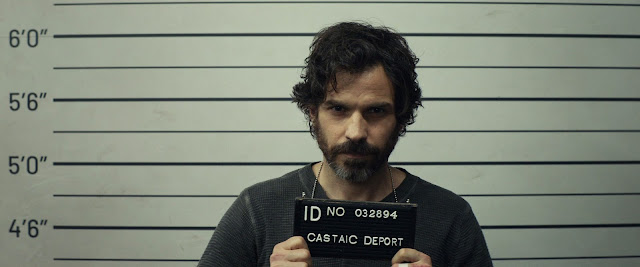 |
| Rios gets arrested by ICE. I'm glad the show has time for this, and that the actual plot won't get badly rushed later on... |
A PROBLEM OF PACING:
Season Two opens extremely well. The first three episodes are quite good, and they set up almost everything that the rest of the season will follow.
The opening episode efficiently shows how the characters have progressed since Season One. The bulk of the episode establishes character arcs and relationships. Then, at the end, Picard encounters a crisis involving the Borg, culminating in the sudden intervention of Q. Episode Two expands on Q's role, as he angrily declares that this not a test or lesson, but rather a "penance" for Picard. The rest of the episode follows the character in a dystopian alternate reality. By the end of the episode, we know that this reality is the result of a single change Q made to the timeline in the year 2024. Episode Three brings the characters to their past/our present and starts the main plot moving, while at the same time establishing Rios's relationship with Teresa and drawing parallels between Jurati and the Borg Queen.
The alternate future is a bit of a generic "evil future"; that aside, this opening Act is pretty close to impeccable.
Too bad that the midseason is the opposite of that.
The middle four episodes do an awful lot of water treading. Watcher, my pick for the season's weakest episode, devotes half its running time to pointless side trips. Rios has an extended misadventure with ICE while Seven and Raffi steal a police car and essentially play real life Grand Theft Auto to try to rescue him. None of this even particularly goes anywhere; once Episode Five rolls around, Seven and Raffi rescue Rios with all the effort of pressing a button, and the whole incident receives only a single mention later. A mention that makes Rios look like an imbecile, at that... though the overall treatment of Rios this year makes me wonder if he hit his head really, really hard between seasons.
The final three episodes pick up the pace again. Episodes 8 and 9 see a welcome return to the high quality of the early episodes, and Episode 10 ends by bringing the story full circle with some excellent character epilogues.
Unfortunately, those character epilogues come after some final plot mechanics that are badly rushed. Episode 10, Farewell, opens with Picard and Tallinn trying to stop the villainous Dr. Soong from interfering in the launch of a very important space mission. This should be tense and exciting, with Picard and Tallinn relying on their wits to evade security to beat Soong to the goal while the not-so-good doctor just as desperately tries to bluff his way through using his credentials and attitude. Because it's all crammed into about twenty minutes, though, neither heroes nor villains experience any obstacles. This should be a highly secure area in the midst of enormous activity, and yet we barely even see any evidence of basic staff. Meaning, yes, the pre-launch party was locked down like Fort Knox while the launch itself has less security than a 7/11!
Ideally, this should have been the focus of one full episode, with the character epilogues and resolution of the initial Borg contact left to be an episode in itself. But I guess we really needed that big car chase and that episode about bad dreams, even if it left the actual season climax feeling like a tacked-on afterthought.
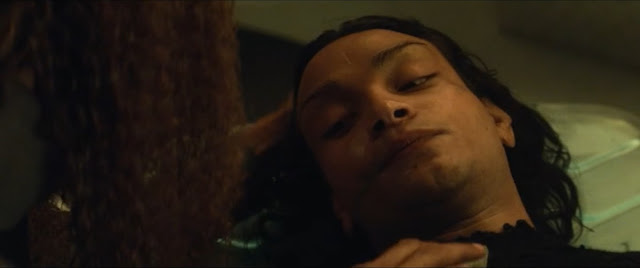 |
| Elnor dies. But don't worry - He gets better. |
CONSEQUENCES ARE FOR REDSHIRTS:
Something unexpected happens in Episode Three: Elnor dies. This sends Raffi into a season-long spiral of guilt and anger, with her clinging to the gossamer-thin hope that if they fix the timeline he'll somehow be brought back to life.
I really hoped that the death would stick. Not because I don't like Elnor; I've actually liked the character since his introduction. However, I am a believer that, with only the rarest exceptions, dead characters should stay dead. In my review, I observed that Elnor's death was a vastly more effective unheroic "pointless death" than Tasha Yar's in TNG, and I appreciated the way it was used to kick off Raffi's character arc. I even liked the ways Elnor was used in the later season, with a flashback in Episode Eight and a hologram in Episode Nine developing Raffi's guilt and, finally, resolving it as much as such issues can be.
Then Q brings him back to life in the finale, because why should there be any lasting consequences? I'm reminded of Q Who?, another story in which Q whisked Picard's crew away from familiar surroundings and put them in danger, as the Enterprise experienced its first contact with the Borg. Eighteen crew members died. When an outraged Picard confronted him about that, Q responded perfectly:
"It's not safe out here. It's wondrous, with treasures to satiate desires both subtle and gross - but it's not for the timid."
But it turns out that Mr. Magic will resurrect the dead - provided they are people close to Picard and provided Q is in a sufficiently sentimental mood. So Elnor gets to live! But it sucks to be one of those eighteen redshirts.
The hilarious thing? I'm pretty sure Elnor isn't in Season Three, so there wasn't even a contractual reason to do this. With regard to the larger series, the resurrection appears certain to end up being less than pointless. And had the group been remembering Elnor in that final scene with Guinan, I think it would have been considerably more effective.
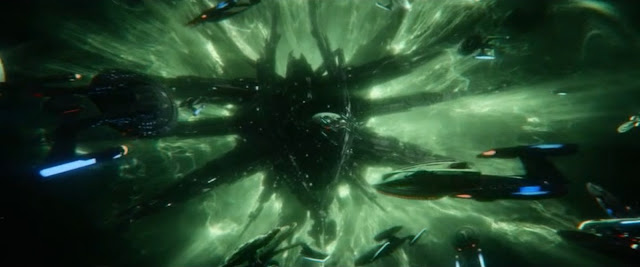 |
| Starfleet faces a threat that isn't exactly as it seems... |
SEASON THREE WISHLIST:
As was true when I made up my "Season Two Wishlist," I'm not going to pretend not to know what was in every single promo for Season Three. I already know that Season Three is, to all intents and purposes, TNG Season Eight.
This is not my preference. One aspect of Picard I've consistently appreciated is that it's balanced nostalgia against being its own series with its own set of regulars. I would have preferred that the series continued doing that. Yes, I enjoy guest appearances by members of the old cast where appropriate - but I would have liked them to remain guest appearances.
Still, the producers made their choice, and overall reception to Season Three indicates that it was the correct one for a lot of fans. Knowing that, my main hope is that the characters are properly utilized. Let's not repeat the mistake of Enterprise's These Are the Voyages, please, in which years had passed but all the characters were still exactly the same. It's been a long time. I hope the show acknowledges that by showing that the characters have moved on in various ways in the interim.
I also hope that the background set up by Picard's first two seasons is not forgotten. Synthetics are now a part of the Federation, though that has come after more than a decade of their mere existence being outlawed. This is an issue that deserves some follow-up. Picard has a synthetic body, which received only a couple of references during Season Two. I don't expect any meaningful follow-up, but I consider the lack of follow-up to have been a missed opportunity. There have been references to a mysterious threat in both seasons, and that absolutely should be addressed.
But my biggest hope is just that Season Three is good. Season One had plenty of flaws, but I liked it overall. I found Season Two to be a bit disappointing, but I still enjoyed more of the episodes than not. In all likelihood, Season Three will be the last time we ever see all of these characters together again, much as was true of Star Trek VI and the TOS cast. As such, I hope it follows in Star Trek VI's footsteps by delivering a final adventure that's worthy of them.
If nothing else, it's almost certainly going to be better than Nemesis. And I say that as someone who mostly liked Nemesis on its own terms.
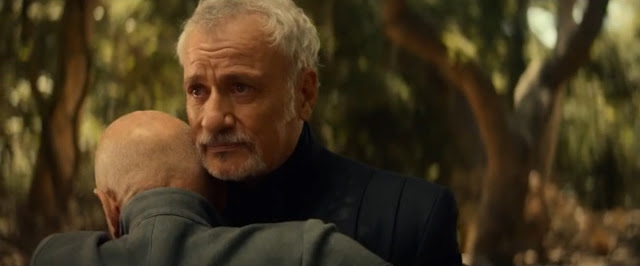 |
| Q and Picard say farewell. |
IN CONCLUSION:
"Potential" was my keyword for Season One of Star Trek: Picard. The season was swimming in interesting ideas, intriguing elements, and enjoyable characters. It didn't always use them as well as I'd have liked, but it was clear that there was the foundation for a legitimately interesting series that went beyond just "TNG nostalgia."
Unfortunately, my keyword for Season Two is "disappointment." I don't think Season Two is bad in the way its worst detractors insist. There are several good episodes and a few very good ones, and even the weakest entries remain watchable (something that wasn't always true of TNG). But the whole ended up feeling like less than the sum of its parts, and I came away feeling... honestly a little discouraged by it.
I'm hopeful that Season Three will stick the landing, and will manage to do so in a way that fits Star Trek: Picard and not just Star Trek: The Next Generation - Reunion. But I have to admit that, even though I enjoyed it well enough on an episode-by-episode basis, Season Two has left me feeling just a bit hollow.
Previous Season: Season One
Next Season: Season Three
Review Index
To receive new review updates, follow me:
On BlueSky:
On Threads:


Addendum: After I wrote this, an article came out detailing changes made to Season 2: https://trekmovie.com/2024/03/09/picard-season-2-was-rewritten-after-paramount-deemed-it-too-star-trek-says-ep/.
ReplyDeleteI am sympathetic to the problems and limitations caused by COVID restrictions. But the execs thought the Star Trek show was “too Star Trek?” FFS…
Anyway, it explains a lot. If anything, we are probably lucky Season 2 didn’t turn out much worse…